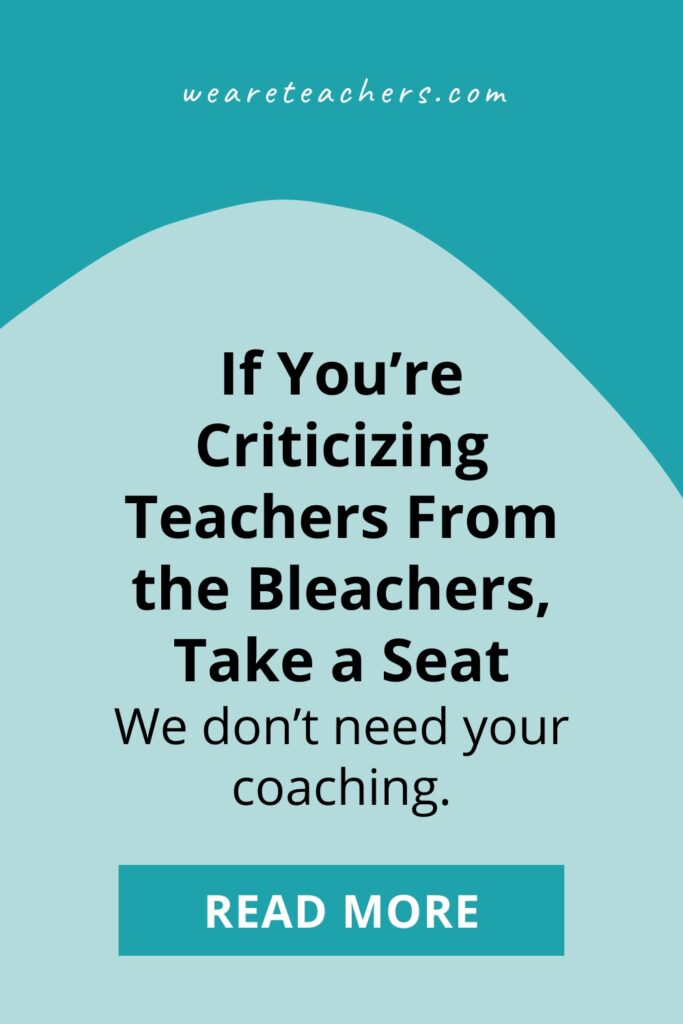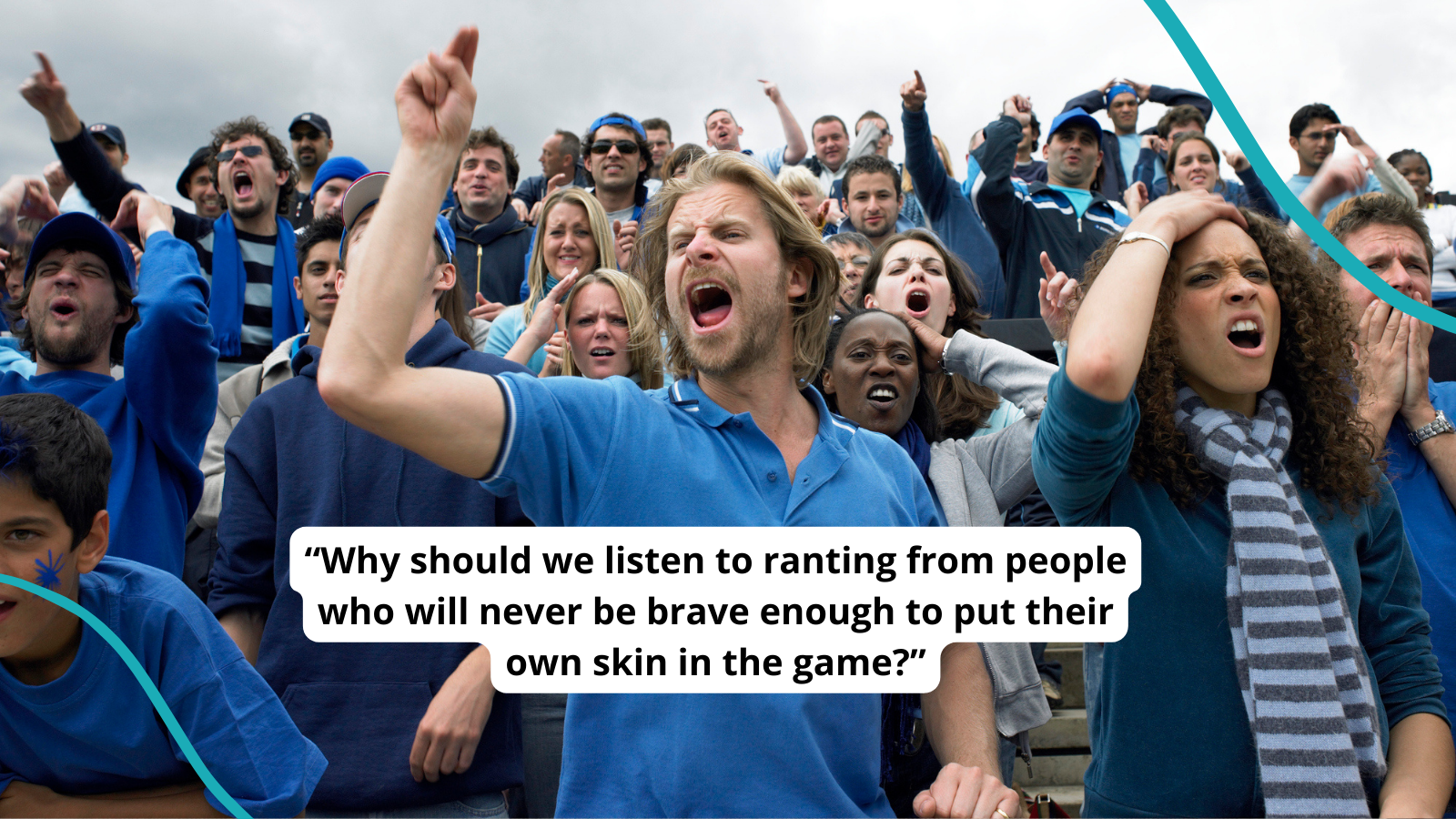Teachers hear it all the time. In their email inboxes, on their screens, and in person.
No matter how often we hear it, it’s still insulting and annoying. And no, it’s not the reminder that we haven’t taken attendance.
It’s the criticism of teachers or education from people who have never taught.
I have a message for these kinds of critics: You’re in the bleachers. Teachers are in the arena.
Take a seat.
The Arena
Over a decade ago—long before 2016, COVID, and our current culture wars—I was struggling as a writer. With a few big articles under my belt, I’d developed a small following. But with any sort of positive attention, of course, comes trolls. At night, I would turn over and over in my mind the nasty criticism and anti-teacher ranting that came my way.
Then a friend recommended I read Daring Greatly by Brené Brown, a book about the risks we take as leaders. In the intro, Brown talks about Theodore Roosevelt’s “man in the arena” quote in a passage that has become one of my favorites:
“If you are not in the arena getting your ass kicked on occasion, I am not interested in or open to your feedback. There are a million cheap seats in the world today filled with people who will never be brave with their own lives, but will spend every ounce of energy they have hurling advice and judgement at those of us trying to dare greatly. Their only contributions are criticism, cynicism, and fear-mongering. If you’re criticizing from a place where you’re not also putting yourself on the line, I’m not interested in your feedback.”
—BrEnÉ brown
I suddenly felt imbued with courage and power.
I didn’t think Brown was saying I could ignore all feedback, or that only people in the arena could ever have valid opinions.
Instead, I felt she was giving me permission to not legitimize the cynicism or reproach of people who will never be brave enough to put their own skin in the game.
Who are these people?
Politicians. School board members. Parental rights groups. They’re our neighbors, people we accidentally talk to at parties. Sometimes they’re in our own family.
They talk about teaching as if they’re experts. Luckily for you, they know what content is appropriate—not just for their child but for every child in every classroom. They know how much homework, classwork, tests, and retests ought to be given and when. They know what teachers should and shouldn’t be doing—inside the classroom and out.
How do they know all of this without being certified? They got a handout or newsletter with talking points. They did a Google search (and printed it out for your meeting). They’ve collected personal observations. Maybe they cite “research” that turns out to be a meme from FreedomEagle.Facebook.net.
But most importantly, they’ll say they don’t need teaching experience or certification. They’ve been students before. They know what good teaching looks like.
In other words, they believe they’re in a position to evaluate teachers … because they once sat in a classroom.
We all roll our eyes at inexperienced people who criticize the experts. Why is it any different for those who tell teachers how to do their jobs?
Can’t we just ignore them?
There’s a term in professional football for fans sitting at home who think they know better than the players on TV: the armchair quarterback.
In football, armchair quarterbacks don’t matter. At all. The real quarterbacks in the NFL can tune out outside criticism and focus on feedback from people trained to support them—coaches, doctors, therapists, PR reps, etc. (It doesn’t hurt that some of them are making more money per game than most teachers will see in a lifetime.)
But while the NFL is a remarkably funded, highly respected, well-oiled machine, the same isn’t true for education. For decades, we have been stripping teachers of their professionalism, power, support, and respect. Teachers are reporting being at an all-time low with morale. We can’t afford to have any voices contributing to the harmful and untrue narrative that teachers destroyed public education.
Education isn’t broken because of teachers. Education is broken because we stopped listening to teachers.
I know the counterpoint here.
“So, what? Bad teachers don’t exist?”
“Should we just accept bad teaching?”
“So we can’t have an opinion or give feedback on anything we’re not an expert in?”
Of course we shouldn’t accept bad teaching. But this is why we have instructional coaches, appraisers, and principals. These are the people who have extensive training in what good teaching looks like. They’re the ones who can and should provide that coaching to the teacher.
Administrators certainly aren’t the only people providing feedback that a teacher should consider. Students, families, and other teachers can provide extremely helpful feedback in shaping us to be better—provided that it’s thoughtful, constructive, and civil. In fact, the best teachers seek out that kind of feedback.
Just to be clear: I’m not saying parents shouldn’t provide any kind of feedback to teachers. If families notice worrisome academic or behavioral patterns, they should absolutely provide that feedback to the teacher on what they’ve noticed, then move up the chain of command if those patterns aren’t addressed.
But thoughtful feedback is different from uninformed, lazy criticism.
Feedback is “Here’s what I’ve noticed from my standpoint. What are your thoughts? Can you help?” Criticism is “I’m in a position to understand both the problem and solution better than you.”
“Johnny is really struggling with multiplying fractions. Regrettably, my math is pretty rusty. Can we talk about some options for supporting him?” ✅
“Mrs. Price is such a bad math teacher. Johnny comes home and has no idea how to do the math homework. Maybe if she wasn’t constantly taking days off, she could actually teach.” ❌
“I’ve noticed that teachers are really struggling. So many teachers I know have left the classroom, and those who are staying have lots of complaints. What can we do to help them?” ✅
“Teachers are by far the biggest complainers. We need to make them all do a real job for a year and see how fast they’ll come back crying.” ❌
See the difference?
What teachers actually need instead of coaching from the stands
Your willingness to listen to the people who do this work day in and day out. Consider their perspective, experience, and expertise. Take a beat before you post that comment or fire off that email.
Your support of public education as a whole. Believe it or not, you can support teachers as a whole even if you’ve noticed some bad apples. That’s what we do for football teams.
Your presence at school board meetings and at the ballot box. Don’t let the conversation be dominated by a handful of radicals—speak up as one of the majority of people who support public schools and teachers.
It’s not just experience that put teachers in a position to make informed decisions in the classroom. There’s situational context. Pedagogy and best practices. School, district, state, and federal laws and protocol. Oh, and a whole classroom full of other children with distinct needs, personalities, and challenges.
There’s way more to this job than you can see from the stands.
Looking for more articles like this? Subscribe to our newsletters.


